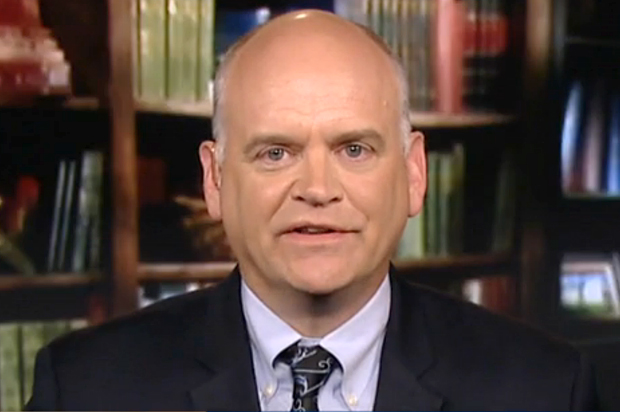Those familiar with National Journal columnist Ron Fournier’s oeuvre know that he has an overriding obsession with “leadership” and the many ways in which President Obama lacks this ill-defined quality. The most common sin against “leadership” that Obama commits, in Fournier’s reckoning, is his refusal to pursue centrist-conservative policies that prioritize slashing entitlements in the name of debt reduction. But other issue areas often get woven into his “Obama must lead!” one-note symphony, and with the president poised to deliver a big speech on how the U.S. will confront the Islamic State (ISIS) in Iraq and Syria, Fournier has figured out how Obama can lead.
To show true leadership, Fournier writes, Obama must indulge the “anger and fear” of the American public and let them know he’s ready to embark upon another expensive, unpopular military adventure in the Middle East:
We’re angry and scared now. We want to fight. History suggests that we will rally behind the commander in chief in the immediate aftermath of tonight’s address. But it wasn’t that long ago—a matter of weeks, really—when “war-weary” was the go-to adjective for “Americans.” We will grow weary again, and Obama may need to draw on tonight’s speech to remind people, “This is why we must fight.”
I honestly don’t understand this. If the polls are to be believed, it’s true that huge portions of the American public are both angry at ISIS and scared. And that is precisely what ISIS intended to achieve by committing horrific acts of violence on defenseless Americans and posting videos of the murders on YouTube. “The video [of James Foley’s beheading], surely meant to sow fear and breed over-reaction, succeeded magnificently,” Dave Weigel wrote for Slate. “The panic showing up in polls, in which the number of Americans favoring airstrikes in Iraq and Syria has surged, has been matched by a return of panic-first politics.”
The “panic-first” instinct has left everyone convinced that ISIS presents an imminent threat to the United States, despite no real indication that this is the case. This sentiment has nevertheless been amplified by careless media coverage and seized upon by the newly invigorated hawks to agitate for more war.
Fournier is arguing that the best course for Obama is to throw in with the general panic. I may be in the minority on this, but generally I tend to take a dim view of major policy decisions made under a pall of terror and rage (see: basically everything done in the name of the war on terror). Any effort to “stop” or “crush” or “destroy” ISIS will require many long years of military action and coordination with unstable and/or uncertain political allies in the Middle East. Were Obama to lay out that case, with an eye on our recent history of difficulties in the region, he might help to cool some of the passions driving our foreign policy at the moment.
But, according to Fournier, looking back on the mistakes of the past is less important than contemplating the possible horrors of the future:
Does he blame Bush or Republicans—or anybody other than ISIS? Leave it to historians to second-guess U.S. policies that created a vacuum for ISIS’s ideology of hatred, starting with Bush’s ill-advised invasion of Iraq in 2003 and including Obama’s ill-fated withdrawal. Obama should focus on the future, hopefully one without another 9/11-size attack.
There’s so much unintended irony wrapped up in that one short paragraph that it’s scarcely believable. Don’t “second-guess” how we got into Iraq the last time around, just focus on how we have to take military action in the Middle East so that we don’t have another 9/11.
But this, apparently, is how a president shows leadership. Instead of trying to rationalize the threat and ensure that we don’t end up doing exactly the wrong thing (again), the president should validate the general sense of terror felt by the public and use it to justify war.
We’ve already been down that road. The lessons should still be fresh in our memories.

